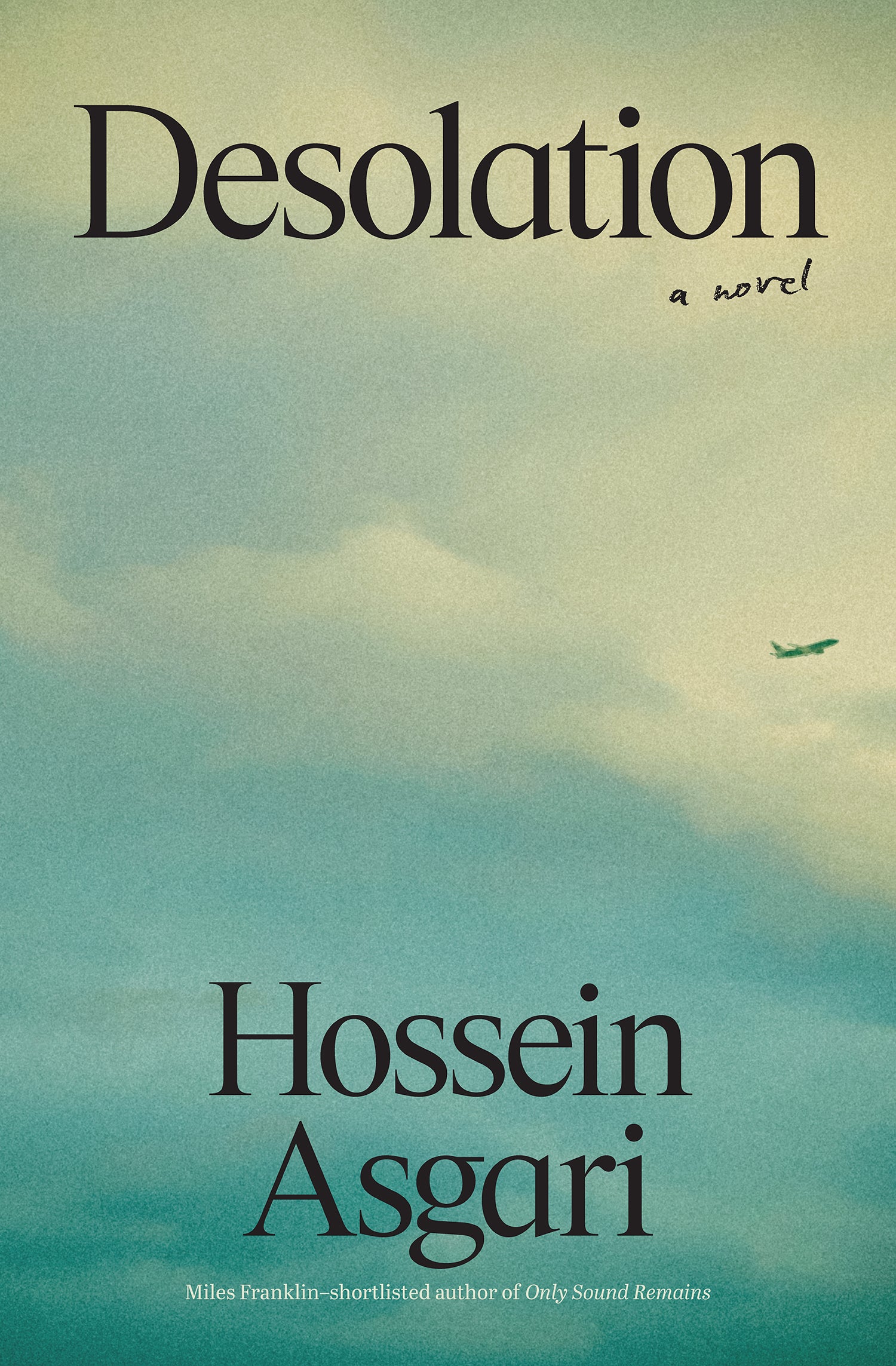‘Literature should make us question things’: Hossein Asgari grapples with memory and grief in Desolation
After his debut novel was unexpectedly shortlisted for the Miles Franklin, Adelaide-based author Hossein Asgari’s follow-up Desolation explores how memory, grief, and acts of violence shape the stories we tell.

When Hossein Asgari heard his debut novel Only Sound Remains had been named on the 2024 Miles Franklin Award shortlist, the news came as a complete surprise – he had barely managed to get it published.
“I had sent it to a couple of publishers – maybe thirteen, I’m not sure – but mostly I got rejections, sometimes just form letters,” he recalls. “After seven or eight months, I thought, ‘Okay, no one wants this. Maybe I should just work on something else.’ Then I got a call. Considering how much I struggled to publish it, I really didn’t expect anyone to be interested.”
Shortlisted for both the Miles Franklin and Victorian Premier’s Literary Awards, Asgari found himself catapulted into the literary spotlight. But the Iranian-born writer insists it did not change his approach to the craft.
“Maybe a little bit of pressure,” he admits. “Because of course you don’t want your next work to disappoint readers. But at the end of the day, I think we write for ourselves, don’t we? I wanted to write this story anyway.”

That new story is Desolation, a powerful and meticulously crafted work set in post-revolutionary Iran, revolving around the shooting down of Iran Air Flight 655 by the USS Vincennes in 1988. The incident killed 290 civilians, with the tragedy reverberating through Iranian society.
You might like
For Asgari, the novel is not only about one appalling act, but also about the echoes such events leave in individual and collective memories. “For me, it’s about how one act of senseless violence can trigger another, and another,” he says. “We talk about numbers – 200 people dead. But for each of those people, there are so many other lives affected, directly and indirectly. Just basically contributing to making this world a more violent place. That’s the link I was trying to make – how something that might be politically forgotten continues to haunt us, years later, in unexpected ways.”
Both Only Sound Remains and Desolation share certain literary devices: both works are structured as a story within a story and use an unreliable narrator. In Desolation, the story is recounted by Amir, a man coming of age during the Iran-Iraq war, whose memories, grief, and trauma both illuminate and distort the events he recounts as he is gradually radicalised.
Both novels also frame the narrative as a story told to an Iranian-born writer living in contemporary Adelaide, a structure that appeals to Asgari both technically and philosophically.
“Having an unreliable narrator gives me freedom,” Asgari explains. “Whatever [my narrators] say, it’s not my responsibility. If they’re delusional or mistaken, that’s their problem, not mine. It also reflects how memory works. We all remember things differently from how they really were.”
Born in Iran and now based in Adelaide, Asgari writes in English, although Farsi is his first language. He describes the shift as transformative.
“When I write in Farsi, I tend to ramble. In English, I’m much slower. I have to build every sentence carefully. It makes the writing tighter, and sometimes I only see the connections between parts of the story later. In Farsi, more happens unconsciously.”
Subscribe for updates
Asgari’s attention to craft shows in his work; each sentence is taut and meticulous, every word chosen with painstakingly care.
Although his novels are firmly works of fiction, they draw deeply on Iranian culture and history. Asked whether he feels a responsibility as part of the Iranian diaspora to bring his people’s experiences to the attention of Australian readers, Asgari is cautious.
“I’m not sure if ‘responsibility’ is the right word. We write about what we know. Iran is what I know – the culture, the history, the ethos of the society. I don’t yet have that deep understanding of Australian culture, even after twelve years here. Maybe over time, more Australian elements will enter my work, but for now, writing about Iran comes naturally.”
"Maybe that’s what literature can do – it helps us understand, and maybe even forgive. Both understanding and forgiving are part of healing."
For Asgari, the act of writing can sometimes bring on homesickness. “Sometimes I feel a little bit bumped and bruised by it,” he admits. “Of course, we get emotionally engaged with our characters – we have to. Otherwise, we can’t write them. But I’m always aware it’s fiction. Maybe that’s what literature can do – it helps us understand, and maybe even forgive. Both understanding and forgiving are part of healing.”
The acclaim of Only Sound Remains may have opened doors, but Asgari remains prolific and driven. His next work is a short story collection due next year with Ultimo Press, and he is revisiting an earlier work written in Farsi.

“I realised I can’t just translate it,” he says of his attempts to reshape it in English.
“In Farsi, I write unconsciously in long, flowing sentences that don’t work in English. So, I’m rewriting, restructuring, cutting. It’s messy, but it shares some characters with Only Sound Remains.”
If Only Sound Remains established him as a writer to watch, Desolation demonstrates his continuing fascination with the entanglement of personal experience, memory and history. “That’s part of the impact of trauma and senseless violence. It’s a human trait to start creating narratives, trying to make connections and find reasons behind things that seem senseless.”
Despite their focus on Iran’s recent history, the themes of Asgari’s novels are especially relevant today; in this era of deep fakes and propaganda, Asgari demands that readers think critically and refuse to accept everything they read on face value.
“I hope it makes them think. Literature should do that – make us question things instead of just accepting whatever story we’re told. Life is never that simple. If my books can help people appreciate complexity, then I’ve done my job.”
Desolation by Hossein Asgari (Ultimo Press) is out September 2025
Free to share
This article may be shared online or in print under a Creative Commons licence

